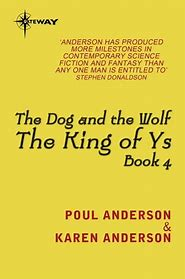The Dog And The Wolf, XII, 1.
When the scheming and conniving Procurator Bacca says that:
"'the interests of Rome...are the interests of civilization itself...'" (p. 235):
"Wind hooted and dashed rain across roof tiles." (ibid.)
Roof tiles represent civilization. Hooting wind represents the hostile elements but also Bacca's threat to the freedom of the former Ysans.
When Gratillonius informs his people of their admittance into the "Republic" (Empire), the weather, including of course the wind, provides a pathetic fallacy:
"The market day shone bright. Clouds scudded over the blue, wavelets ran upon rain puddles, the woods tossed and distantly roared as wind bit into them, leaves broke free of yonder red-brown-yellow minglement and scrittled across fields, the last migratory birds trekked aloft with cries ringing as cold as the air, all the world seemed to be in departure. That, at least, was right, thought Gratillonius." (p. 237)
This time, the viewpoint character confirms the pathetic fallacy: the brightness of a new beginning and the departure of olden freedoms.
When he has finished speaking:
"The wind scattered his words with the dead leaves." (p. 240)
Section 2 begins:
"He shut it out when he closed the door of Cadoc's house behind him." (ibid.)
"...it..." is the wind, ever present although we can shut it out for a while.

1 comment:
Kaor, Paul!
I remember that part, and the note written by the Andersons about it. They commented about how while the oppressions Gratillonius dreaded seemed tame to us, jaded as we were by the horrors of totalitarianism, it was real to him.
Ad astra! Sean
Post a Comment